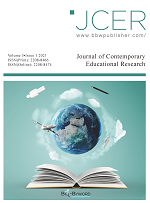Abstract
Intelligent Education uses AI technology as a means in the education ecology to promote the automation and intelligence of education and teaching. It reshapes the education ecology, adding AI things to the traditional education ecology that dominated by teachers and students. Although IE technology is widely used, there is little discussion about a comprehensive overview of IE. The goal and connotation of IE is discussed. Meanwhile, the emotional, ethical, AI technology as well as supervision and management perspectives in IE are discussed too. The core goal of IE is putted forward that is human-oriented and individualized development of students is. Finally, the education ecology with dual-teacher collaborative in intelligence education was proposed.
References
Carbonell JG, Gil Y, 1990, Machine Learning: An Artificial Intelligence Approach, Morgan Kaufmann Publishers Inc., Ch. Learning by Experimentation: The Operator Refinement Method, 3: 191-213.
McLaren TB, Van Gog C, Ganoe M, et al., 2016, The Efficiency of Worked Examples Compared to Erroneous Examples, Tutored Problem Solving, and Problem Solving in Computer-Based Learning Environments, Comput. Hum. Behav. 55: 87-99.
Najar A, Mitrovic B, McLaren, 2016, Learning with Intelligent Tutors and Worked Examples: Selecting Learning Activities Adaptively Leads to Better Learning Outcomes than a Fixed Curriculum, User Modell. User-Adapted Interaction 26 (5): 459-91.
Hershcovits D, Vilenchik K, 2020, Modeling Engagement in Self-Directed Learning Systems Using Principal Component Analysis, IEEE Trans. Learn. Technol. Learn. Technol. 13 (1): 164-71.
Dodero JM, García-Peñalvo FJ, et al., 2016, Development of E-Learning Solutions: Different Approaches, A Common Mission, Revista Iberoamericana de Tecnologias del Aprendizaje 9 (2): 72-80.
Baker RSJ, 2007, Modeling and Understanding Students’ Off-Task Behavior in Intelligent Tutoring Systems. In Proceedings of ACM CHI: Computer-Human Interaction, 1059-68.
Amalathas S, Mitrovic A, Saravanan R, et al., 2010, Developing an Intelligent Tutoring System for Palm Oil in ASPIRE. Proceedings of the 18th International Conference on Computers in Education, Nov. 29-Dec. 3, AsiaPacific Society for Computers in Education, Putrajaya, Malaysia, 101-3.
Fournier-Viger P, Nkambou R, Mephu E, 2010, Building Intelligent Tutoring Systems for Ill-Defined Domains. In: Advances in Intelligent Tutoring Systems, Nkambou, R., R. Mizoguchi, and J. Bourdeau (Eds.). SpringerVerlag, Berlin, Heidelberg, 81-101.
Brunstein A, Betts S, 2009, Anderson JR Practice Enables Successful Learning Under Minimal Guidance. J Educ Psychol 101:790-802.
